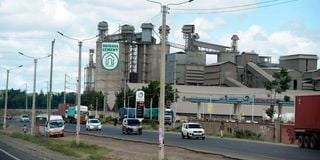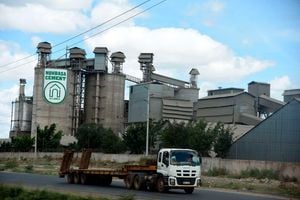
Mombasa Cement Limited along Mombasa road in this picture taken on May 28, 2023.
Mombasa Cement has lost its fight for a 7.4-acre land in Mavoko worth Sh350 million, after its application to file a Supreme Court case against three brothers was dismissed.
Court of Appeal judges Patrick Kiage, Kathumira M’Inoti and Francis Tuiyott dismissed Mombasa Cement’s application, holding that the firm did not raise any new question of general public importance and which would warrant the Apex Court’s interpretation.
The decision now confirms three brothers – Harish, Bharat and Ashvin Ramji – as the legal owners of the 7.4-acre land, ending a 14-year-old saga.
Both parties claimed to have bought the land from the National Social Security Fund (NSSF).
Mainly, Mombasa Cement wanted the Supreme Court to decide whether discrepancies in ownership documents and their ensuing transfer papers are enough to quash a title deed.
That request stemmed from the Court of Appeal’s ruling that discrepancies in land registration numbers on a title deed and transfer papers filed by the Ramji brothers were on account of a clerical error.
The firm also wanted the Supreme Court to review what happens when the validity of ownership documents is challenged. The Court of Appeal, in denying Mombasa Cement permission to move the case upstairs.
Justices Kiage, M’Inoti and Tuiyott held that the disputed judgment was in line with past Supreme Court decision which answered the questions, with finality, which Mombasa Cement wanted to take before the highest court in the land.
The judges held that in line with Supreme Court decisions, when a title deed is contested, the process of acquisition carries the day, and that is where Mombasa Cement’s case fell apart.
The cement firm did not file a sale agreement between it and the NSSF. The Ramjis filed a sale agreement dated December 22, 2006.
Mombasa Cement also wanted the Supreme Court to wade into determination of who is entitled to benefit from court orders, as its payment for the 7.4-acre land stemmed from a consent in a case filed by Harp Investco, one of the other land buyers, against the NSSF.
Mombasa Cement was not a party in that case, but Golden Terrace was. The suit was filed after it emerged that in some cases, the NSSF had sold the same piece of land to different buyers.
A consent was reached by parties. and adopted by the High Court, to allow all buyers with sale agreements to conclude their purchases.
Mombasa Cement, aside from not having a sale agreement, was not a party to the case.
Justices Kiage, M’Inoti and Tuiyott have stated that the Supreme Court in the past ruled that under the doctrine of mergers, someone not party to a case cannot seek to gain benefit from consent orders arising out of the action.
“More crucial is that the applicant was not a party to the consent, and if we may add, therefore to the decree, and could not draw a benefit from it. While the applicant may take a view that the two findings by this Court are erroneous, it fails to demonstrate that the Court disregarded the doctrine of merger.”
“Second, we have not been shown any decision of this Court that endorses the position that a decree whose basis is a consent that is counter-statute can be relied upon to found a cause of action,” the judges said.
The Ramjis held that they were nominees of Golden Terrace, a company that had paid for 120 acres of NSSF land, in which the disputed portion fell.
Golden Terrace was a party in the case that spawned a consent order allowing buyers with sale agreements to complete their deals with the NSSF.
Mombasa Cement on its part claimed to have paid Sh8.7 million to the NSSF for the land.
The Ramji brothers filed a suit against Mombasa Cement in 2010 as both parties claimed to have bought the prime land from the National Social Security Fund.
The High Court ruled in Mombasa Cement’s favour, prompting the Ramjis to challenge that decision at the Court of Appeal.
Meanwhile, the Court of Appeal has suspended a criminal case that the Directorate of Criminal Investigations intended to bring against the Ramji brothers on account of a Mombasa Cement complaint.
The DCI investigation alleges that the Ramji brothers forged documents to acquire their 120-acre land.
The Ramji brothers filed a High Court case challenging their intended prosecution, which Justice Dorah Chepkwony dismissed in July, holding that the investigation was still ongoing.
“After the interested party’s claim premised on inter alia alleged fraud was dismissed by Court of Appeal, the interested party lodged a complaint with the police in January 2024.”
“The above uncontroverted facts, the existence of a Court of Appeal decision dismissing the allegations of fraud, the above cited provision of the Evidence Act and an intended appeal to the Supreme Court in our view constitute exceptional circumstances which should influence this Court in granting or refusing to grant the stay sought,” Justices Jessie Lesiit and John Mativo ruled.
The two judges in their ruling held that the allegations of forgery came up in the Court of Appeal.
At the time of the ruling by Justice Lesiit and Mativo, the bench with Justices Kiage, M’Inoti and Tuiyott was yet to determine whether to allow Mombasa Cement’s application to the Supreme Court.
Justices Mativo and Lesiit said that if the civil case was to move to the Supreme Court, its outcome would affect the intended prosecution.







